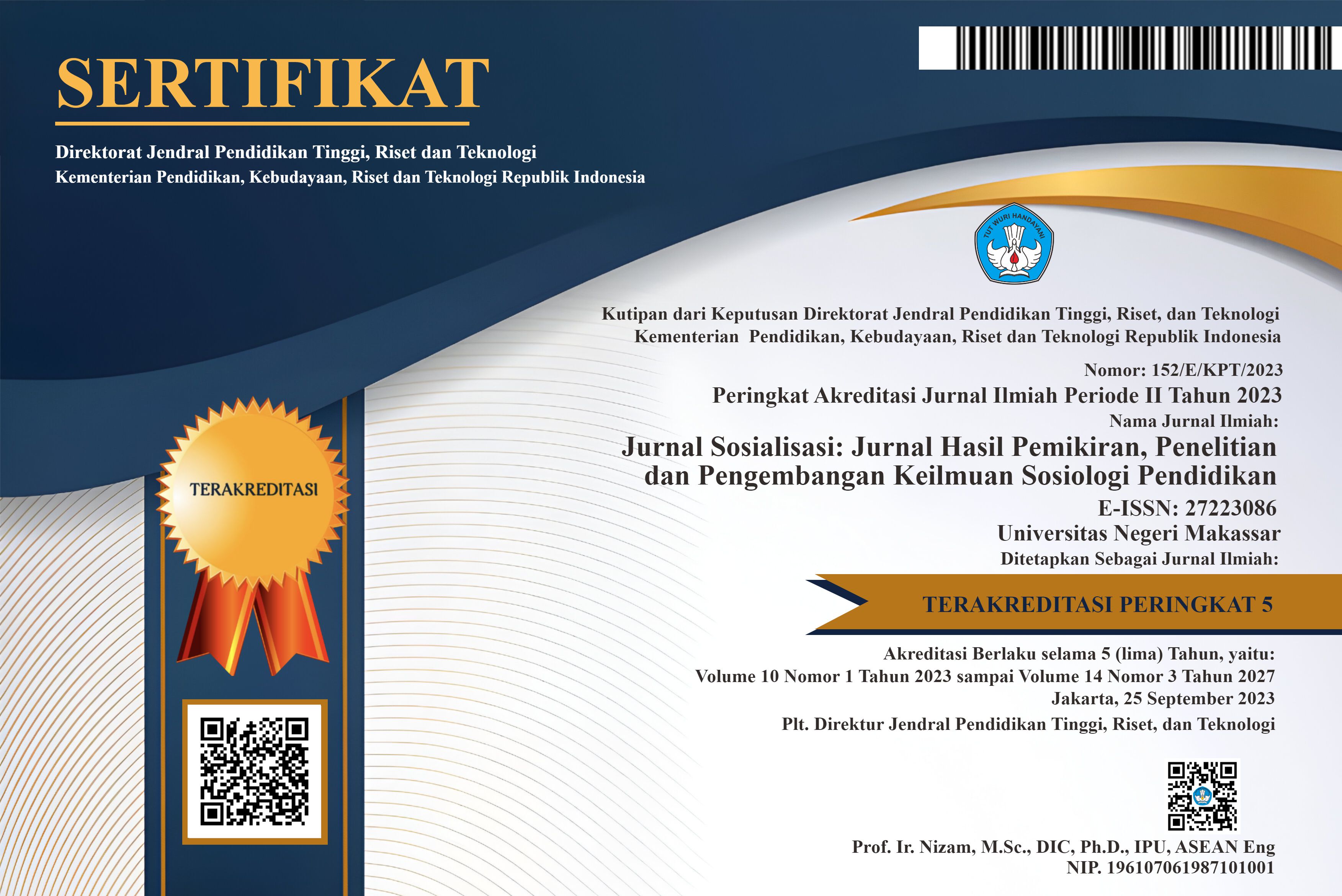Analisis Penanganan Teroris Kelompok Mujahidin Indonesia Timur (MIT) Pasca Konflik Di Kabupaten Poso
(1) Prodi Sosiologi, Fakultas Ilmu Sosial dan Ilmu Politik Universitas Kristen Tentena
(2) Prodi Sosiologi, Fakultas Ilmu Sosial dan Ilmu Politik Universitas Kristen Tentena
(3) Prodi Pendidikan Matematika, Fakultas Ilmu Keguruan dan Ilmu Pendidikan, Universitas Kristen Tentena
(4) Prodi Ekonomi Pembangunan, Fakultas Ekonomi, Universitas Kristen Tentena
(*) Corresponding Author
DOI: https://doi.org/10.26858/sosialisasi.v1i1.43252
Abstract
Keywords
Full Text:
PDFReferences
Amidhan. et al. (2005). Poso, Kekerasaan yang Tak Kunjung Usai: Refleksi 7 Tahun Konflik Poso. Jakarta: Komnas HAM.
Aritonang, J.L. 2004. Sejarah Perjumpaan Kristen dan Islam di Indonesia. (cetakan I). PT. BPK Gunung Mulia, Jakarta.
Arif M, Kerukunan Beragama Pada Era Globalisasi, 1997, Bandung
Aragon, Lorraine. 2001. “communal violence in Poso, Central Sulawesi; where people eat fish and fis eat people”, Indonesia.
Ball. N (2001), “The challenge of rebuilding war-torn socities” chester ACrocer, fen oster Hampson, Pamela Aal turbulent Peace: The Chalenges of managing International Conflict, Washington DC: United States of Peace Press.
Bhabha, K Homi. 1984. Of Mimicry and Man:The ambivalence of ColonialDiscourse Author.
Bellina, Sophie & Mahyani, Ahmad. (2021). Penyitaan Harta Teroris yang telah meninggal Dunia oleh Negara.. Mimbar Keadilan. 14. 230-240. 10.30996/mk.v14i2.5269
Creswell, John W. (1994). Research Design: Qualitative & quantitativee approach.Thousand Oaks, London, New Delhi: Sage
Damanik, R. 2002. Konflik Poso, Skhema Analisis akar dan sebab-sebabnya. paper, disampaikan pada Konsultasi Pemantapan Perdamaian Poso Tentena. Akademi LeimenaJakarta & DPP-GKST, 7-11 Pebruari 2002.
___________2003. Tragedy Kemanusiaan Poso, Menggapai Surya Pagi melalui Kegelapan Malam. Jakarta & Palu, PBHI, CD Bethesda, LPSHAM Sulteng.
Daniele Gazotti, 2014. Conflic resolution in the context of early childhood billingual education-towards a multicultural development.Revista Bruseilira The Linguiston Aplicudu, Vol. 14, No. 2 Belo Horisonte Apr/June 2014. ISSN 1984-6398
Dave Mcrae, 2016. Poso sejarah komprehensip kekerasan antar agama terpanjang di Indonesia pasca refrmasi. CV. Marjin kiri, srpong tanggerang selatan.
Denzim, Norman K., and Lincoln, Yvonna S. 2009. Handbook of qualitative research (terjemahan). Yogyakara Pustaka Pelajar
Fisher, Simon. 2001. Mengelola Konflik: Ketrampilan & Strategi untuk Bertindak (edisi bahasa Indonesia), The British Council, Indonesia, Jakarta.
Galtung,Johan,2003, Studi Perdamaian, Perdamaian dan Konflik, Pembangunan dan Peradaban. Surabaya,PustakaEureka
George J. Aditjondro, 2004. Kerusuhan Poso dan Morowali, Akar Permasalahan dan Jalan Keluarnya, Makalah, ProPatria, 7 Januari 2004
Gogali, Lian. 2011. Konflik Poso, Suara Perempuan dan Anak Menuju Rekonsiliasi Ingatan. Galang Press Yogyakarta
Haba. J, 2006. Analisis SWOT : Kearifan Lokal Dalam Resolusi Konflik, paper, tidak dipublikasikan
Hasrullah, 2009. Dendam konflik Poso (periode 1998-2001) konflik Poso dari Perspektif komunikasi politik,PT. Garamedia Pustaka Utama, Jakarta, 2009
Kusuma, Grace & Pratiwi, Tiffany. (2020). Pemberian Status terhadap Teroris berdasarkan konvensi Jenewa. JDP (Jurnal Dinamika Pemerintahan). 3. 133-146. 10.36341/jdp.v3i2.1347.
Kurningsih, N. (2004) Resolusi Konfli Pengelolaan Tanah Ulayat (studi tentang upaya Pemerintah Kabupaten dalam menangani konflik antara masyarakat adat desa tangkan dengan PT Hasfart Utama estate di Kabupaten Barito Selatan). Tesis tidak diterbitkan Universitas Gajah Mada Jogyakarta.
Miles, Matthew B. dan Huberman, A. Michael.1992. Analisis Data Kualitatif: Buku Sumber tentang Metode-metode Baru, Cet. 1, Jakarta: Penerbit Universitas Indonesia.
Puguh, Oleh & Siwi, Elang Puguh Raka. (2020). Strategi Teroris dalam Mencapai kepentingannya Melalui Kekerasan
Ramsbotham, O.,woodhose, T., & Miall, H. (2015), Contemporary Conflict Resolution. Cambridge United Kingdom: Polity Press
Reychland, Luc. 2006. Researcher Peace Building Architectur. (Leuven: Centre for Peace Research and Strategic Studies)
Suprapto . 2013. Revitalisasi Nilai-nilai Kearifan Lokal Bagi Upaya Resolusi Konflik. Jurnal Walisongo, Vol. 21. No.1
Syafiq, Muhammad. (2021). Proses Perubahan Diri Seorang Teroris Menjadi Aktivis Perdamaian. Jurnal Ilmiah Psyche. 15. 73-92. 10.33557/jpsyche.v15i2.1564
Thahir, dkk. (2018). Paradigma Baru Penanganan Terorisme di Sulawesi Tengah. 13. 105-120
Yakobus, I Ketut, dkk.(2019). Revitalisasi Nilai Budaya Sintuwu Maroso Sebagai Alternative resolusi pasca konflik dikabupaten Poso. Jurnal sosio sains 5 (1) 14-21, 2019
Yakobus, I Ketut, dkk.(2019). Hybridization of the Poso Conflict Resolution Discourse. IOSR Journal Of Humanities And Social Science (IOSR-JHSS). Volume 24, Issue 5. e-ISSN: 2279-0837
Yakobus, I Ketut.(2020).Hibridisasi Wacana: Strategi Penyelesaian Konflik. ISBN 978-623-7729-45-7. Scopindo Media Pustaka, Surabaya
Article Metrics
Abstract view : 96 times | PDF view : 22 timesRefbacks
- There are currently no refbacks.

This work is licensed under a Creative Commons Attribution 4.0 International License.


































